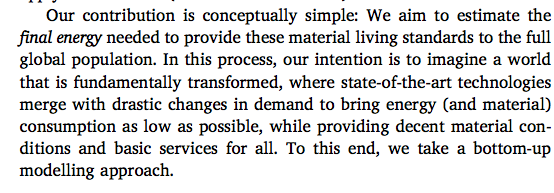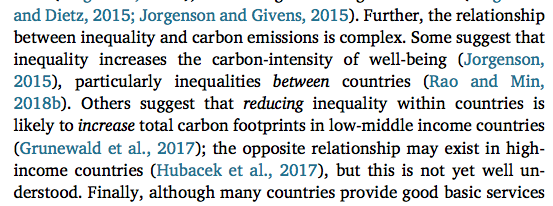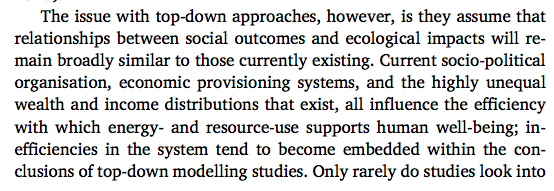Imagine a world that is fundamentally transformed, where state-of-the-art technologies merge with drastic changes in demand to bring⚡️and material consumption as low as possible, while providing decent material conditions and basic services for all. A bottom-up modelling approach 



I'm all giddy inside 😁a huge told-you-so-moment. Justification for my Twitter-spamming and how (holistically correct!) I perceive the climate and ecological crisis. Likely, too for my how-to to get where we as species must be closeR to in 10-15yrs. 🙌 Eg:
https://twitter.com/anlomedad/status/1261171536934862848
Most won't read the paper. But Twitter makes it a little more likely that people might read a thread summarizing @JKSteinberger et al new article:
sciencedirect.com/science/articl…
Information uptake in native language helps subconscious processes so there's a link to🇩🇪version at the end
sciencedirect.com/science/articl…
Information uptake in native language helps subconscious processes so there's a link to🇩🇪version at the end
A thread summarizing my layperson's take-away from @JKSteinberger's and colleagues' new paper
"Providing decent living with minimum energy: A global scenario",
sciencedirect.com/science/articl…
The words below are a direct quote from it, as an amuse-gueule 😁💫
"Providing decent living with minimum energy: A global scenario",
sciencedirect.com/science/articl…
The words below are a direct quote from it, as an amuse-gueule 😁💫
https://twitter.com/anlomedad/status/1311933388660539394
The paper explores, how our species' population at assumed peak in 2050 might offer "A Good Life for All".
[eg like @jasonhickel expanded on O-Neill's groundbreaking framework here static1.squarespace.com/static/59bc0e6…
The figures wd need tweaking, tho. For one, because they're for 2˚ 😬]

[eg like @jasonhickel expanded on O-Neill's groundbreaking framework here static1.squarespace.com/static/59bc0e6…
The figures wd need tweaking, tho. For one, because they're for 2˚ 😬]


But in their paper, Steinberger and colleagues use a different (to O'Neill's) perspective of decent living requirements, wrt material and services: bottom-up.
Column 3 is where they did or did not apply regionalisation to account for eg, cultural or climatological differences.
Column 3 is where they did or did not apply regionalisation to account for eg, cultural or climatological differences.

I've often read this, too: well-being is put into causal relation to high GHG emissions.
Makes me *smh* each time I read it.
[Just bc for 250yrs energy source was fossil fuel it doesn't mean it has to stay that way, aye? Hence, well-being has little causal connection to GHG🤷♀️]
Makes me *smh* each time I read it.
[Just bc for 250yrs energy source was fossil fuel it doesn't mean it has to stay that way, aye? Hence, well-being has little causal connection to GHG🤷♀️]

Here, too, I've *smh* often:
How we produce and sell things a) doesn't HAVE to stay the same and b) CAN not stay the same.
[ Sustainability research, eg by award-winning Hauschild (2017) lays out in rather more detail 😁what I allude to in this tweet:
How we produce and sell things a) doesn't HAVE to stay the same and b) CAN not stay the same.
[ Sustainability research, eg by award-winning Hauschild (2017) lays out in rather more detail 😁what I allude to in this tweet:
https://twitter.com/anlomedad/status/1286162802504343552]

[Hauschild's framework 2017 and other papers like it do research both, bottom-up and top-down sustainability in production.
The answer to "Can a yacht be built?": No, it can't.
It's a different mindset we all need to adopt🤷♀️to keep planetary boundaries and to minimize ecocide.]
The answer to "Can a yacht be built?": No, it can't.
It's a different mindset we all need to adopt🤷♀️to keep planetary boundaries and to minimize ecocide.]
[Hauschild isn't cited in Julia's paper. But I find him worth mentioning.
And this second one I find worth ! reading...to get your own "holistic juices"flowing sciencedirect.com/science/articl… IMO, we need 1-2 generations to adopt the intuitive mindset. Until then, oversight is req'ed.]
And this second one I find worth ! reading...to get your own "holistic juices"flowing sciencedirect.com/science/articl… IMO, we need 1-2 generations to adopt the intuitive mindset. Until then, oversight is req'ed.]
[This is by Hauschild, Rockström and others from 2017. Not so good, IMO. mdpi.com/2071-1050/9/2/…
https://twitter.com/anlomedad/status/1289882684802707456]
Back to Julia's paper. (I am reading it for the first time while I compose this thread by the way.)
They focus "final" energy needs of individuals. Bc focus on "primary" leads astray from individual well-being, often also under wrong assumptions wrt amount of req'ed energy.
They focus "final" energy needs of individuals. Bc focus on "primary" leads astray from individual well-being, often also under wrong assumptions wrt amount of req'ed energy.

Expressly not in the $$-affordability paradigm, the paper then describes some of its reasoning for final energy demand on sufficiency level:
eg, km travelled is related to population density and also to state-of-the-art mass transport options (few individual powered vehicles!).

eg, km travelled is related to population density and also to state-of-the-art mass transport options (few individual powered vehicles!).


Here's their factors for calculating final energy demand. "LAT" = increased demand if state-of-the-art tech isn't available
(The column "Default levels" relates to individual or household, 4 ppl assumed – but without being marked as such in *each* instance. Bit confusing, no?)
(The column "Default levels" relates to individual or household, 4 ppl assumed – but without being marked as such in *each* instance. Bit confusing, no?)

Then they explain why they assume a 1:1 replacement of global buildings with thermally-adjusted ones. 😱I know, right?
But hey, 39% of workers say their jobs are useless. That should reduce the # of buildings to replace 😁 Speech by the late David Graeber
But hey, 39% of workers say their jobs are useless. That should reduce the # of buildings to replace 😁 Speech by the late David Graeber
https://twitter.com/XrRebel/status/1301568239873519618
"remains a valid concern that...there would be a huge spike in energy use and carbon emissions. However, these temporal dynamics are beyond our current scope."
Not to mention ecocide and destruction of carbonsinks from raw material extraction and unlikely in situ 1:1 replacement
Not to mention ecocide and destruction of carbonsinks from raw material extraction and unlikely in situ 1:1 replacement

[Global South has a building gap🏥🏭to fill, which'll inevitably cause emissions and ecocide. G-North can't squander that.
Okay. That's a potential pitfall for the study's usefulness if buildings turn out to be a huge factor in their overall sum total of final energy required😬]
Okay. That's a potential pitfall for the study's usefulness if buildings turn out to be a huge factor in their overall sum total of final energy required😬]
This calculation omits the environmental cost of new buildings described above.
It also seems to inappropriately mix annual energy with total Life Cycle Energy required? Dunno. I'm probably misunderstanding the paragraph.
It also seems to inappropriately mix annual energy with total Life Cycle Energy required? Dunno. I'm probably misunderstanding the paragraph.

[ In 2017, of the 97Gt of raw material (plus 25Gt biomass), big chunks were for construction (in G-North). But only 30Gt/a are sustainable: mdpi.com/2079-9276/8/3/…
Bringezu states: 5t per person per year, including 2t biomass for a population of 10bn in 2050. ]
Bringezu states: 5t per person per year, including 2t biomass for a population of 10bn in 2050. ]
[How would one write the paper if one incorporated such boundaries? Dunno. But in mid latitudes with ! renewable ! energy, homes and office buildings requiring heating don't need rebuilding? Cooling is a different matter. Currently used air condition heats up the outside a LOT..]
[It'd be good to see s/o expand on this study regarding said limits.
Also, the assumed living space allocation of 15 sqm per household person in G-North means a reduction in # of houses to be replaced. Has that been incorporated? Mansions are dead.🤷♀️
Back to the good stuff. ]
Also, the assumed living space allocation of 15 sqm per household person in G-North means a reduction in # of houses to be replaced. Has that been incorporated? Mansions are dead.🤷♀️
Back to the good stuff. ]
Another reason why to mistrust IEA glass ball witchcraft. 💪
While they do graciously allow a stove in each household,
the people working there, and people like Edenhofer, too, simply can't envision a life without marble countertops and hence don't adjust global "requirements".
While they do graciously allow a stove in each household,
the people working there, and people like Edenhofer, too, simply can't envision a life without marble countertops and hence don't adjust global "requirements".

[To minimize ecocide and poisoning of fresh water, to prevent destruction of carbon sinks and biodiversity,
the fraction "marble countertops" of researchers must adjust their minds or all of their output remains useless and them informing policy, stays dangerous to the public]
the fraction "marble countertops" of researchers must adjust their minds or all of their output remains useless and them informing policy, stays dangerous to the public]

So, (including the open question re housing energy and building reqs), according to Julia and colleagues,
the final energy need in 2050 of 10bn people amounts to 75% below that what the people working at IEA assume - and what they inform policy with...🙈
the final energy need in 2050 of 10bn people amounts to 75% below that what the people working at IEA assume - and what they inform policy with...🙈

This shows per capita energy requirement in 2050 in the 3 countries and global. Eg, Rwanda's regional specificity of the model estimates low mobility and thermal-comfort requirements. 

[Told u so.] Conclusion:
"demand-side solutions are an essential part of staying within planetary boundaries".
"high-quality, low-energy housing, widespread public transport, and diets low in animal-based foods globally"
≠ living in caves. 💪😁👏👇
"demand-side solutions are an essential part of staying within planetary boundaries".
"high-quality, low-energy housing, widespread public transport, and diets low in animal-based foods globally"
≠ living in caves. 💪😁👏👇

They finish acknowledging that the steps how to get there, and quickly enough, is missing.
[☝️I can help😁
Via knowledge revolution wrt why it's needed and what the bulk of the overhaul requires: non-profit, rations and home guarantees for 10/15 yrs in a ~global system hiatus🖖]
[☝️I can help😁
Via knowledge revolution wrt why it's needed and what the bulk of the overhaul requires: non-profit, rations and home guarantees for 10/15 yrs in a ~global system hiatus🖖]

• • •
Missing some Tweet in this thread? You can try to
force a refresh






